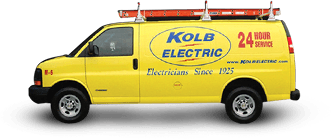Everything seems fine, then POOF—your power goes out. Chances are, you tripped a circuit breaker. Electrical problems are one of those things that tend to make a homeowner’s stress level skyrocket. You’re not sure what’s wrong, but suddenly you’ve lost access to the power you depend on in your DC area home!
A breaker can trip for many reasons. Below are the top five causes of an electrical breaker tripping in your home.
Looking for electrical repair in Washington, DC? Contact Kolb Electric today!
Why Is My Circuit Breaker Tripping?
A breaker trip is the result of a circuit tied to your circuit breaker exceeding its safe parameters. They can be identified by a sudden loss of power to specific appliances (those that used a dedicated circuit, like a fridge or microwave), or a loss of power in your home that is limited to a specific area.
A lot of issues can result in breaker trips, but these are the ones our DC electricians address most often during electrical repairs in Washington, DC:
- Overloads. A circuit overloading is the most common reason for a breaker trip. This means you have too much stuff loaded on the breaker. Breakers have a “safe limit” of power to supply to your appliances and home. If this is exceeded, the breaker will trip. This happens most often when you try to install a new appliance that your electrical system cannot support, or if you plug in a very high-power appliance like a space heater in an area that lacks access to safe amperage.
- Short circuiting. This happens when a “hot”, or active wire comes into contact with other hot wires (for example, when a 120 hot touches another 120 hot). You’ll usually see blackening around the outlet or smell burnt wires when this happens. If you’re dealing with a short circuit, do not interact with your outlet at all. Leave the breaker tripped, and call an electrician right away.
- Ground fault. Literally a fault when attempting to “ground” your wires, a ground fault is similar to a short circuit, if not identical. The difference is in the interaction. A ground fault is when a hot wire meets your grounding wire, and thus the safe “grounding” of your outlet becomes void and dangerous. Handle this the same way you would a short circuit; call an expert!
- Appliance failure. Appliance failure ties to overloading, as a damaged, faulty, or incompatible appliance can draw more power than it should and initiate an overload. When a breaker trips, it’s a good idea to check all of the appliances related to that breaker. If any are hotter than usual, the problem may not be with the outlets or breaker, but with a specific appliance.
- Storms. Lightning striking a nearby electric cable or your home can kill all of your breakers in one blow, or may only affect one or two. Usually, the problem doesn’t last longer than the storm itself, but if you can’t get power back on, you should call for electrical repair in Washington, DC.
Looking for superior service and quality from your electrician? Contact Kolb Electric for electrical repair in Washington, DC!










